Japanese investors favour non-manufacturing sectors
On February 11, AEON Mall Vietnam began construction of a new shopping mall in the central province of Thua Thien-Hue, making it the first in the region and the seventh in the country as a whole. Costing about $170 million and to be operational in 2024, it demonstrates the Japanese retail giant’s ambition to expand its footprint here.
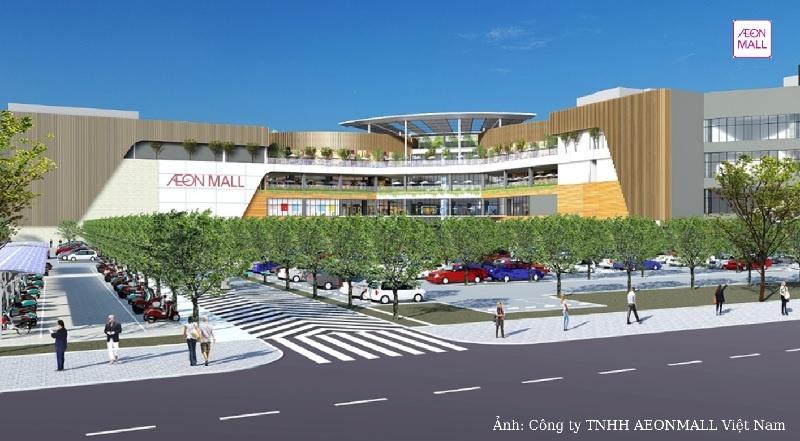 |
| AEON Mall Vietnam/ Photo source: aeonmall-vietnam.com |
AEON Mall chairman Iwamura Yasutsugu said, “The project is an important milestone marking its 10-year presence in Vietnam. We will continue to develop more trade centres in all regions.”
Retail is one of the non-manufacturing sectors that Japanese firms are planning to expand further in the next 1-2 years in Vietnam, as outlined in an investment performance survey of about 4,400 Japanese businesses operating in roughly 20 nations in Asia and Oceania. The survey, which included 600 businesses in Vietnam, was released on February 13 by the Japan External Trade Organization (JETRO) in Hanoi.
Takeo Nakajima, chief representative of JETRO Hanoi, told VIR last week, “The reasons for expansion among Japanese firms are that they expect revenue growth thanks to market expansion and export growth, as well as high growth potential,” he explained. “They tend to look towards high added-value products and multi-functional ones.”
Nakajima elaborated that the average export to revenue ratio of Japanese enterprises in Vietnam was 51.4 per cent in 2022, up 0.5 percentage point from a year earlier. Their export markets are Japan (65.6 per cent), ASEAN (12.9 per cent), the US (4.9 per cent), and China (5.6 per cent).
Vietnam, where total retail sales and services revenues marked double-digit growth in 2022, is recovering and growing rapidly from previous years. As a result, the survey noted that 80 per cent of enterprises in the retail sector plan expansions into retail. The rate was also 80 per cent in real estate and 77 per cent in finance and insurance.
According to Vietnam Industry Research and Consultancy, with a high economic growth rate and rising middle-class, Vietnam is among the world’s most promising retail markets. It already attracts strong attention from global retail giants such as AEON, FamilyMart, K-Mart, Lotte, Central Group, Circle K, Mega Market, and others.
In the survey, remarkably, all Japanese businesses surveyed seek to expand activities into education and healthcare. Vietnam is faced with health challenges due to its rapid urbanisation, ageing population, climate change, and environmental health, and more people are requiring healthcare services and drugs. Meanwhile, Japanese businesses have strong expertise in these fields.
Market research firm IBM forecasts that the scale of the Vietnamese pharmaceutical industry could reach up to $16.1 billion by 2026 from $7.7 billion by late 2021, with a compound annual growth rate of 11 per cent.
Top Japanese names including Nipro Pharma Corporation and Taisho Pharmaceuticals. The latter holds a controlling stake in DHG Pharmaceutical JSC, Vietnam’s biggest publicly traded drugmaker.
Nipro Vietnam, meanwhile, has been boosting its presence in the country. General manager Hiroaki Sasaki said, “We will continue to focus on high-quality drugs with Japanese technology. Through our expansion, we are creating jobs for locals, and commit to long-term sustainable manufacturing.”
Similar attraction has been seen in the education sector, realty, and finance and insurance. Last year, all Japanese firms doing business in finance and insurance made a profit versus 91.7 per cent in 2021, according to the survey.
Japanese investors name advantages in the local market for their activities. They include growth potential, market size, the living environment for foreign employees, labour recruitment, social-political situation, and others. For instance, the number of Japanese businesses citing the advantages of market growth is 17.2 points higher than the ASEAN average. And those citing the advantages of market size is 7.2 points higher than the ASEAN average.
In general, 60 per cent of Japanese firms plans expansions in Vietnam in the next 1-2 years, up 4.7 percentage points from a year earlier. The rate is only behind India and Bangladesh and ranks first in ASEAN. In the non-manufacturing sector, the rate of businesses eyeing enlargement activities is 65.9 per cent, up 7.2 percentage points on-year.
Despite expansion plans and confidence, Japanese businesses are worrying about a number of risks from rising salaries, cumbersome administrative procedures, unofficial costs, and low localisation rates. As shown in the survey, two-thirds of groups name admin procedures as a business risk, compared to 47 per cent in ASEAN on average. The rate related to tax policy is 58 per cent versus 42.7 per cent in ASEAN; and the rate for completion of legal frameworks is 55.3 per cent versus 44.8 per cent in ASEAN.
“While low labour cost is an advantage for Vietnam in foreign investment attraction, fast salary rises have been causing difficulties for labour recruitment,” said Nakajima of JETRO. “Vietnam is now named in the group of nations with a higher salary increase. Other regional countries like Thailand, Singapore, and China have seen lower wage increases, thus narrowing the gap of labour cost between them and Vietnam.”
Regarding localisation rates, Nakajima added it has increased gradually since 2010, reaching 37.3 per cent in 2022, but it has been much slower than in China (68.4 per cent), Thailand (57.3 per cent), and Indonesia (47.2 per cent).
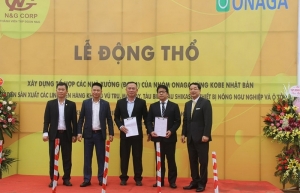 | Japanese investors seeking increase of localisation ratio Japanese enterprises are promoting more connections with domestic partners to increase the localisation ratio. |
 | Japanese investors circling around greener ventures Japanese investors are planning to pour more money into renewables and environment-based projects in Vietnam, as part of both nations’ drive to help Vietnam achieve sustainable development. |
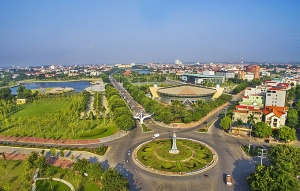 | Vinh Phuc strengthens connection and cooperation with Japanese investors The Vinh Phuc conference on strengthening Vietnam-Japan cooperation and development will take place on June 23 both in-person and online at the Dic Star Hotel in Vinh Yen city. |
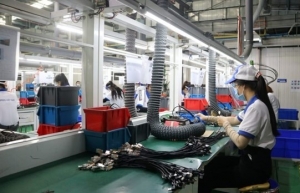 | Long An seeks to attract more Japanese investors The People’s Committee of the Mekong Delta province of Long An on August 23 held an investment promotion conference and a dialogue with Japanese enterprises. |
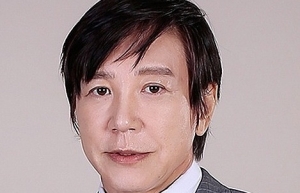 | Quang Ninh becomes viable option for Japanese investors Vietnam’s northern province of Quang Ninh is emerging as an attractive investment destination for foreign investors. Nakajima Takeo, chief representative of the Hanoi Office of the Japan Trade Promotion Organisation and vice president of the Japanese Chamber of Commerce and Industry in Vietnam, talked to VIR’s Minh Anh about Japanese interest in the area and the future trends ahead. |
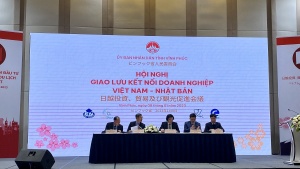 | Japanese investors look for opportunities in Vinh Phuc 25 Japanese enterprises are seeking investment opportunities in Vinh Phuc and other inter-regional projects. |
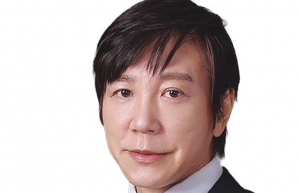 | Japanese investors keeping eye on fresh 2023 trends Last year was a complex one for Japanese businesses operating in Vietnam. After a turbulent 2021, we expected 2022 would accelerate Vietnam's recovery path. However, things have not been easy with the pandemic earlier in the year, the Ukraine conflict beginning, increased energy and logistics costs, and Chinese restrictions. |
What the stars mean:
★ Poor ★ ★ Promising ★★★ Good ★★★★ Very good ★★★★★ Exceptional
Related Contents
Latest News
More News
- SK Innovation-led consortium wins $2.3 billion LNG project in Nghe An (February 25, 2026 | 07:56)
- THACO opens $70 million manufacturing complex in Danang (February 25, 2026 | 07:54)
- Phu Quoc International Airport expansion approved to meet rising demand (February 24, 2026 | 10:00)
- Bac Giang International Logistics Centre faces land clearance barrier (February 24, 2026 | 08:00)
- Bright prospects abound in European investment (February 19, 2026 | 20:27)
- Internal strengths attest to commitment to progress (February 19, 2026 | 20:13)
- Vietnam, New Zealand seek level-up in ties (February 19, 2026 | 18:06)
- Untapped potential in relations with Indonesia (February 19, 2026 | 17:56)
- German strengths match Vietnamese aspirations (February 19, 2026 | 17:40)
- Kim Long Motor and AOJ Suzhou enter strategic partnership (February 16, 2026 | 13:27)

 Tag:
Tag:


















 Mobile Version
Mobile Version